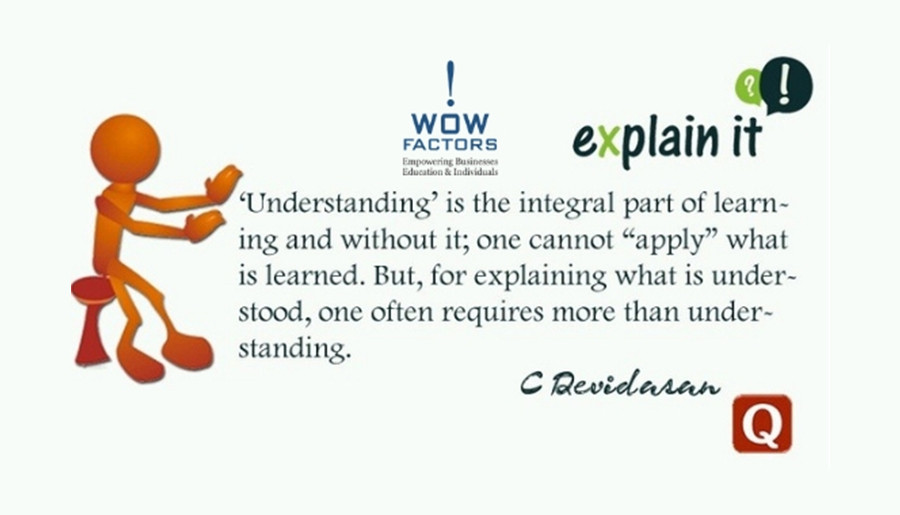“If you can’t explain it simply, you don’t understand it well enough,” We know that these words came from Albert Einstein. ‘Understanding’ is the integral part of learning and without it; one cannot “apply” what is learned. But, for explaining what is understood, one often requires more than understanding.
For example, the one who is weak in communication, explaining becomes a barrier even if he is an authority in what he wants to explain! Then there are things like ‘recalling’ and ‘structuring’ of information in a framework with a flow that is ‘logical’ with a ‘conclusion’ in the end to give the ‘full picture’ to the receiver of the information to induce ‘clarity.
Explaining things can either be orally or in writing. In writing, one gets time to refer to the knowledge repositories ‘inside or outside,’ polish what is written to make it precise and then present. For a planned speech or a presentation too one gets time to ‘prepare’ whereas while explaining something in a conversation or in an extempore, one does not have this luxury because he is thinking ‘off the cuff!” Due to this, people always face difficulties in explaining things in a live conversation/speech which gets compounded with weak vocabulary and grammar even resulting in bad body language and loss of ‘connect.’
Clarity of thoughts comes from clear thinking. But where does mind gets this property? The expression “Mind” came from the Sanskrit root “Manan” meaning to “churn” because mind churns the inputs that are given to it to form ‘meaningful’ conclusions to enable man to take actions. The more it is churned, the more refined is the quality of comprehension. The more it is churned, quicker its responses become.
Therefore to make mind more efficient, it is important to continuously challenge it by asking questions, forcing it to use reasoning, seeking multiple opinions with logic on issues that lacks clarity. We have even lost the ability to remember the telephone numbers or spellings of the commonly used words. Gone are the days mathematical tables are learned, bi-hearted and used in calculations. We forget the name of a person often immediately after he is introduced. Mind works with photo-chronic speed provided it is challenged. When challenged, it processes, stores the processed information, recalls it whenever needed and even tells you where to ‘connect it in the context’ infusing “clarity!”
It is also important to know what is called “Anthakaran” or inner organs of the mind explained in Vedas comprising of “Aham” or the feeling of Self (Ego), “Chit” or “the state of mind,” “Buddhi” or “that makes wisdom possible” and “Manas” or Mind itself. A disturbed ‘Chit’ could make inferior comprehension and hence one is advised to do Mediation, etc. Similarly, the feeling of ego, if not controlled blocks the Self from knowing the ‘true nature.’ When these two pervade, “Buddhi” cannot be evolved and hence the level of intelligence remains inferior.
So, while explaining one must keep a calm mind to maintain the purity of “mindset” or chit, recall the processed information to vet it with Buddhi to structure your thoughts and be cautious that it is devoid of ego induced arrogance either in words or tone.





